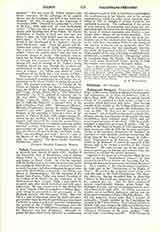

Talleyrand-Perigord, CHARLES-MAURICE DE, Prince of Benevento, Bishop of Autun, French minister and ambassador, b. in Paris, February 13, 1754; d. there, May, 1838. The eldest of an ancient French family, he was destined for Holy orders, owing to an accident which had made him lame. After having completed his studies at the College d’Harcourt, he went to St-Sulpice and, against his inclination, became an abbe. He then read the “most revolutionary books”, and at length, giving up his priestly life, plunged into the licentiousness of the period. Having, nevertheless, been ordained priest (1779) and appointed general agent of the clergy (1780) he rapidly acquired a reputation as a man of ability. The Assembly of the Clergy of France of 1782 appointed him their promoter, and in 1785 he became secretary. Owing to his notorious immorality he obtained an episcopal see only through a promise wrung from the dying king by his father, Comte Daniel de Talleyrand. Consecrated on January 16, 1789, and promoted to the Bishopric of Autun, he appeared in his diocese only to be elected a member of the “Etats Generaux”. He soon became one of the most important personages in Europe, and utilized every opportunity to advance his private interests.
Opposed in his heart to a revolution which he accused of having “dismembered France“, he first advised Louis XVI to dissolve the Assembly, but believing the democratic movement irresistible he joined it. As a member of the Constitutional Committee, he took part in the “Declaration of the Rights of Man“. He extolled the spoliation of the clergy and took the oath to the Civil Constitution. His chapter, however, having described him as deserving “infamy in this world and damnation in the next”, he resigned his see. But he had consecrated several constitutional bishops, given Gobel the Bishopric of Paris, and was excommunicated by pontifical Brief of April 13, 1791. In 1792 he was sent to London on an unofficial diplomatic mission and endeavored to organize a Franco-English alliance. He did not, however, obtain more than a promise of neutrality. Finally banished by the Convention, he escaped to the United States. Tie returned to Paris in March, 1796, and, owing to the influence of Barras, was appointed Minister of Foreign Affairs. He immediately welcomed Bonaparte as the great auxiliary “who would make everything smooth”. With Bonaparte and Sieyes he prepared the coup d’etat of Brumaire, after which he assisted the First Consul in the drafting of the Concordat. The pope meanwhile had released him from the ban of excommunication and restored him to secular life and the lay communion. Napoleon then compelled him (1803) to marry by civil law his mistress, Madame Grand, an English divorcee, who had not lived with her former husband. As the principal agent in the treaties concluded by Napoleon, he obtained for his services a fortune of some sixty million francs. He was made grand chamberlain, vice-elector of the Empire, and Sovereign Prince of Benevento. However, he advised against the Franco-Russian Alliance and resigned the ministry in August, 1807. His opposition to the Spanish War in 1809 was the cause of his complete disgrace, and he awaited at Valencay at his hotel in the Rue St. Florentin the fall of Napoleon.
In 1814 the Emperor of Russia, his guest, “committed himself entirely into his hands”. Once more leader of the provisional Government, he made the Senate establish a constitution to give power to Louis XVIII. On his appointment as Minister of Foreign Affairs he preserved to France its frontiers of 1792, and at the Congress of Vienna he broke the union of the great powers by secretly concluding a treaty with Austria and England. Again appointed minister of Louis XVIII (1815) he preserved his country from dismemberment, but left the presidency of the Council after the election of August 22, 1815. As grand chamberlain and peer of France, he hence-forward contented himself with watching and sententiously criticizing events. In 1830 Louis Philippe, whose accession he had favored, appointed him to the embassy of London, where the representatives of all the countries “bent before him”. After having established the entente cordiale with England, he resigned office in November, 1834. In his magnificent “solitude” of Valencay he wrote his “Memoires”, in which he asserts he “never had betrayed a government which had not betrayed itself first”, nor ever put his “own interests in the balance with those of France“. Four hours before his death he signed, in the presence of Abbe Dupanloup, a solemn declaration in which he openly disavowed “the great errors which . had troubled and afflicted the Catholic, Apostolic and Roman Church, and in which he himself had had the misfortune to fall”.
GUSTAVE GAUTHEROT

